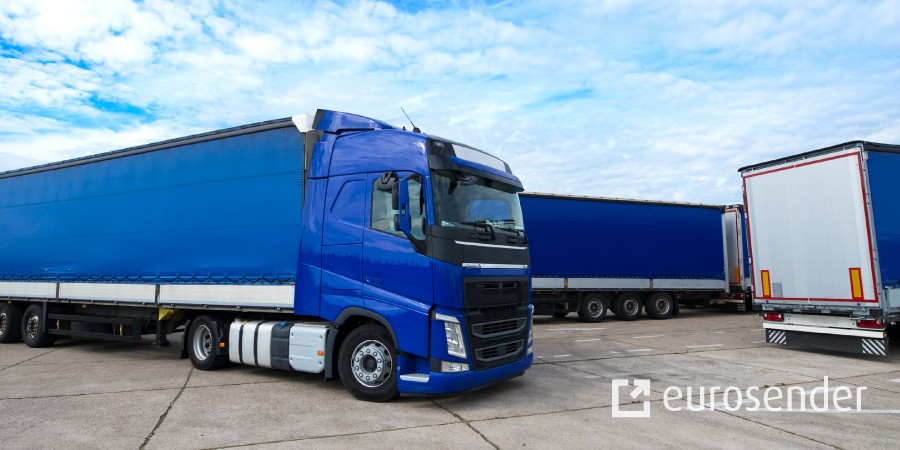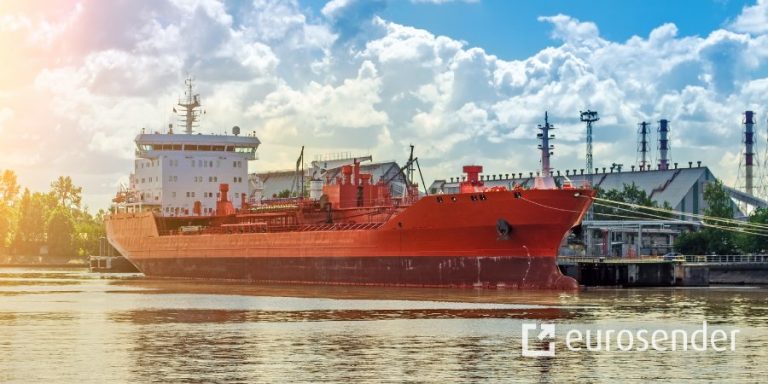Dry Van Shipping: What Does It Mean in Trucking?
TL;DR
- A dry van is a type of enclosed semi-trailer used for transporting non-perishable goods, protecting shipments from external elements.
- Common dimensions for dry vans include 53′ and 28′, with weight limits of 20,400 kg and 10,200 kg respectively.
- Benefits of dry van shipping include affordability, versatility for various cargo types, and enhanced security against theft and weather.
- Limitations include capacity restrictions for oversized freight, vulnerability to moisture, and potential wear on wooden flooring.
In logistics, dry van transport services are one of the most commonly used forms of freight shipping. “Dry van” is a term related to the trucks or vans used to haul cargo. To fully understand what dry van means in trucking, we need to look into more detail at how it works and when it is used.
Create an account for free!
What is a dry van, and when is it used?
A dry van, also called a “dry van trailer” or “box trailer”, is a type of semi-trailer that is completely enclosed on all sides to keep shipments “dry” and safe from external elements.
Dry van transport services are suitable for types of cargo that do not require temperature-controlled vehicles during transit. The load travels in a fully sealed and enclosed vehicle, looking “like a box”, with a loading and unloading door on the back of the truck.
If your cargo is neither perishable nor oversized, chances are that it will be shipped in a dry van. You use dry van services for both short- and long-distance transport.
Read more about:
What are the dimensions of a dry van?
Although dry vans have varying dimensions, there are a few industry-standard sizes. Some of the most common dry van dimensions include:
How much weight can you put on a dry van?
If we consider 53′ and 28′, two of the most common sizes of dry van freight containers, the respective weight limits are 20,400 kg and 10,200 kg. Bear in mind that some dry van shipping drivers prefer to travel 450-2,000 kg under the weight capacity to ensure cargo and driver safety.
Continue reading:
- How many pallets fit in a truckload?
- How tall can a pallet be for shipping?
- Oversized pallet delivery services
What are the characteristics of dry van shipping and how do they differ from other methods?
Dry van shipping involves a sealed container being attached to the rear of a semi-truck. Unlike refrigerated containers or “reefers”, there is no climate control in dry van shipping, but there is more space to safely transport large quantities of cargo. Dry van trailers are available in various materials, but the main materials used are galvanised steel, aluminium, hardwood, or iron.
Another important characteristic of dry van shipping is that it is not possible to transport oversized goods larger than the container size. For such items, a flatbed truck would be the best transport choice.
Flatbed trucking is another common shipping method, which is often used for overweight and oversized freight. Standard flatbed trucks consist of a long open bed connected to a semi-truck. Stop deck trailers offer two different deck levels for machinery to be transported.
What can you send with dry van freight shipping services?
Dry van freight shipping services are used to transport a wide variety of goods, as long as they are non-perishable, such as:
- Furniture and other household goods
- Electronics
- Clothing and retail products
- Cosmetics
- Non-perishable foods and beverages (packaged)
- Healthcare equipment
- Cleaning products
- Industrial equipment and machinery
- Construction materials
- Paper, books, and publishing equipment
- Automotive parts and items
- Agricultural equipment
More on industry-specific logistics services:
What are the benefits of using dry van transport services?

1. Affordability
With dry van shipping, it’s easier to save costs compared to other freight transport methods since vehicles are readily available. Also, dry vans don’t need additional features such as refrigerated containers. It is one of the most affordable shipping options available, even for long-distance shipments.
2. Versatility
You can choose dry van shipping for most non-perishable goods or, basically, anything else that can fit into the trailer and does not require a temperature-controlled environment. A dry van trailer is designed to carry palletised, boxed, or loose freight.
3. Security
Dry van shipping is one of the most secure types of shipment because it protects the cargo in such situations:
- Protection from elements: The four walls of the truck protect shipments from harsh weather conditions such as snow, wind or rain. Maximum safety is guaranteed no matter the season or transit distance.
- Protection from theft: Unlike flat deck trucks or curtain-side vans, dry vans use sealed containers, which greatly reduce the risk of theft.
4. Drop and hook options
These options allow the carrier to drop an empty trailer at the destination and pick up a full one, which speeds up turnaround times and prevents wasted time at either end of the journey.
Are there any disadvantages when using dry van services?
1. Capacity restrictions
Since dry vans use sealed containers, there are length, height, and width limits that may exclude wide or oversized freight.
2. Vulnerable to moisture
Dry vans are not climate-controlled, so temperature and humidity in containers can be impacted by bad weather. You should not choose dry van shipping services for perishable items that require controlled temperatures.
Need to ship perishable items? Check our refrigerated transport services.
3. Wooden flooring
Most dry van shipping containers have wooden flooring, which can wear out over time with moisture build-up and damage from heavy items.
Dry van freight shipping services with Eurosender
At Eurosender, you will receive all of the benefits mentioned above through our network’s carriers and more! The greatest advantage of booking dry van transport services through us is that we work with many carriers that can meet all of your shipping demands at any time. Choose reliable dry van freight services in Europe at the most competitive rates through us!
Interested in learning more about pallet and freight shipping? Check all our articles about pallet deliveries.
Create an account for free!
About the author






